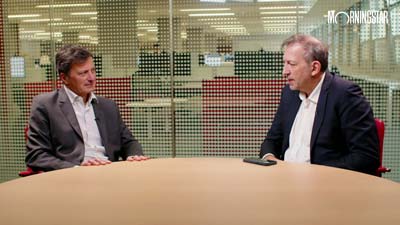TRANSCRIPT
Christine Benz: Hi, I'm Christine Benz for Morningstar.com. The index fund recently celebrated its 40th birthday. I sat down with Jack Bogle, Vanguard founder, to discuss that milestone.
The index fund celebrated a big birthday, anniversary--whatever you want to call it, 40 years. Let's talk about that. This was your doing, and let's talk about whether the uptake of indexing was what you expected. Did you expect it to take off faster than it did?
Jack Bogle: I expected it to take off. Two things, one good--one positive and one negative. The negative, that I expected it to take off much faster than it did. It took 20 years until the mid-'90s …
Benz: Right.
Bogle: … for it to begin to gain real traction, and then it accelerated and the growth from 1995 to 2016 has been astonishing, and it's sustained and the cash flows are over 100% of the industry's. Vanguard leads in that, of course. And so, it's a lot of good for a lot of people. People say why doesn't everybody start an index fund? And I said the answer to that is very simple: All the darn money goes to the investors. This is a business …
Benz: The money is not in it for the …
Bogle: Yeah, they are in it to earn a return on the capital, particularly the capital that owns the firm, all those conglomerates that own these firms, and the mutual fund division of that firm or the mutual fund organization, it's a subsidiary, has to produce a return on the buyers' capital. And if you don't, the buyer will get somebody who will. I mean it's a hard--capitalism is a hard business. But the capitalism in our business should be focused on the shareholder who puts up the money, puts up the capital, takes the risk in order to get all the reward and he only gets about a third of it over time. So, it's amazing to think in this index boom, we have only one vaguely serious competitor that would be Fidelity, to Vanguard.
And of course, BlackRock is not as big as we are in indexing, but overall they're a much bigger firm than Vanguard, to which I have zero envy. Size is not a great blessing. Size carries with it a lot of administrative baggage, a lot of struggle to recognize the people that are doing the work around the company, and a lot of bureaucracy. I was telling someone the other day, Christine, that I've been worried about size, getting too big, for as long as I can remember.
Benz: Vanguard's size, though, has really been increasing exponentially over the period.
Bogle: Yeah, and I'm not saying we should stop it. I used to have these arguments with the directors about slowing down our growth. And they said, well, look, you do that and there will a be a whole lot of investors that deserve to be in Vanguard that won't be there. And so, in any event, I've been worried about it for so long and in a speech I gave in 1989 to the Vanguard crew, I said we're starting to get big and I hope we're very careful as we get bigger and bigger. I'll do my best to make sure that we always--that Vanguard is always a place where judgment has at least a fighting chance to triumph over process. And I talked about the perils of looking like a giant mutual insurance company, life insurance company, casualty company, which is impersonal and all rigid, bureaucratic, about the perils of getting anywhere near that. And when I gave that speech our assets were $47 billion. I'm not saying we should stop it.
I am saying we should be very focused on what we have within here. We have terrific crew members, a terrific crew, under Bill McNabb, great leaders, and I think they are doing everything they can, but size is a captivating, capturing kind of thing that grabs you a little bit more with each passing day. And we are still able to attract very wonderful young people and still able to retain terrific veterans. I go to a lot of these retirement parties, at 25-year parties, and my God, the quality of people we have here, they just people who are dedicated, they know what they're doing. They know about the company's values and they love the people they work with, their little teams all over the country, all over the company. So I'm wary of size and everybody knows that. I've said it so many times. It would be a little ridiculous to try and deny it.
Benz: Have you been concerned about the products that have cropped up outside of Vanguard mainly under the index umbrella that really don't, in your view, do justice to your original idea?
Bogle: Concerned, angry, astonished--there is a fringe element, it is almost entirely in the ETF industry. That's a marketer's dream. People who have no background in the business--Henry Kaufman caused them financial buccaneers--come into the business with a hot idea and they want to sell--I won't name any names--they want to sell whatever is hot. I have read interviews with these managers, in Barron's, kind of frightening. And they say, well, I know that Japan and Europe, two of their funds, are currency-neutral funds, aren't going to last forever, so we'll think of something else when they fail. Is that the way to be in this business, to market products? I don't even like the word product. I banned it here, actually, years ago, and it came back. You used to pay a $5 fine if you ever mentioned it. I didn't think we were manufacturers selling products. I thought we were trustees selling fiduciary services. People would say that guy is a real sap. And he probably is, but I have an idealistic view of the business.




















